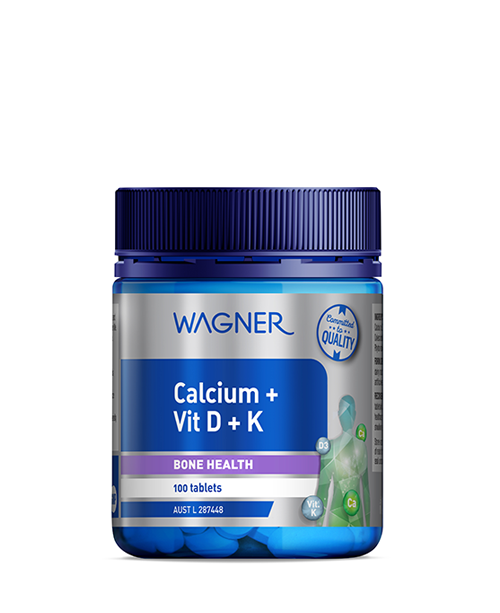
Contains Calcium, which may assist in the prevention of osteoporosis when dietary intake is inadequate. Contains Vitamins D & K to support the development and maintenance of strong healthy bones. Contains nutrients which support healthy bone mineralisation and density.
Available in: 100 Tablets
Calcium is involved in the development and maintenance of the bones and teeth. A diet that is deficient in Calcium can lead to osteoporosis in later life. Adequate dietary Calcium throughout life is required to maximise bone. Vitamins D and K also support healthy bone mineral density.
Recommended Adult Dosage:
Take 3 tablets daily with food or as directed by your healthcare professional.
BONE HEALTH
Suggested Companion Products:
Wagner Mega B+: Mega B+ contains B vitamins which support the health and function of the nervous system.
Wagner Super Bio Magnesium:
Contains Magnesium to support proper muscle and nerve function and it plays a role in muscle contraction.
TAKE WITH FOOD
Precautions and contra-indications:
Always read the label; take only as directed. Vitamin supplements should not replace a balanced diet.
Formulated without:
Gluten, wheat, dairy products, egg, artificial flavours, artificial sweeteners or preservatives.
Each tablet provides
Calcium (as Calcium citrate tetrahydrate) 333mg
Colecalciferol (Vitamin D3 332 IU) 8.3μg
Phytomenadione (Vitamin K1) 133μg
Q1 What is Calcium and why is it important?
A1 Calcium plays an essential role in helping to maintain bone
health. However, this important mineral also performs other
functions in your body.
For example, it is involved in maintaining strong teeth, as well
as normal blood coagulation, nerve impulse transmission,
muscle contraction, and maintaining the normal healthy
functioning of the heart.
Q2 What is osteoporosis?
A2 Osteoporosis is a condition in which bones become brittle and
weak – fracturing more easily and taking longer to heal again.
It is becoming increasingly common in Australia: Osteoporosis
Australia reported that 4.74 million people over 50 experienced
osteoporosis or osteopenia (low bone density)1.
Women are at a greater risk of developing osteoporosis
because of the rapid decline in oestrogen levels during
menopause. When oestrogen levels decrease, bones lose
calcium and other minerals at a much faster rate. As a result
a bone loss of approximately 2% per year occurs for several
years after menopause2.
There are three factors that can support bone health: a good
Calcium intake, enough Vitamin D, and regular weight bearing
exercise. None of these factors is enough on its own; but
together, the three combine to support healthy bone mineral
density. It’s important to start building bone density as early
as possible in life, since most people reach their peak bone
density around age 30.
Q3 How much Calcium do most people need?
A3 The recommended daily intake for Calcium varies according
to your age and gender. The Nutrient Reference Values for
Australia and New Zealand for Calcium RDIs for adults are3:
• Men: 1000mg/day for men aged 19-70; and 1300mg for men
aged 70+
• Women: 1000mg/day for women aged 19-50; and 1300mg
for women aged 50+
Ideally, most of this intake will come from dietary sources such
as dairy products, bony fi sh (e.g. anchovies or sardines), and
some legumes and nuts. However some people may benefi t
from topping up their dietary intake with a supplement.
